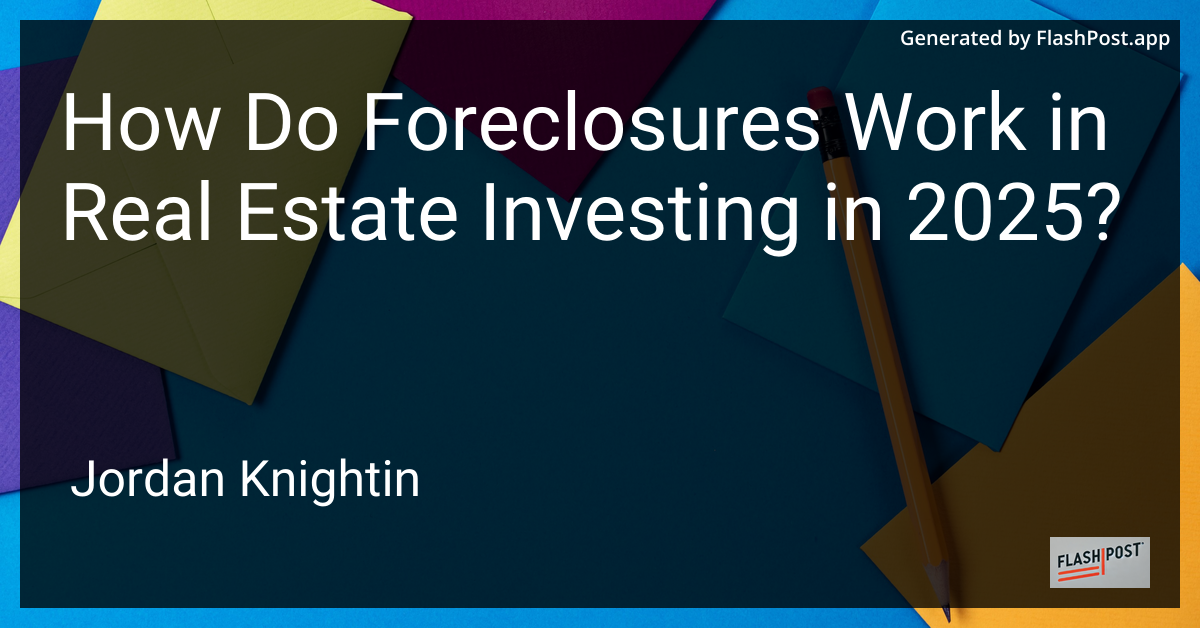

How Do Foreclosures Work in Real Estate Investing in 2025?
Foreclosure investing remains one of the most intriguing opportunities in real estate for investors seeking substantial profits with potentially low entry costs. Understanding the foreclosure process and how it operates in 2025 is crucial for investors aiming to navigate this aspect of the real estate market successfully.
What is Foreclosure?
Foreclosure is a legal process where a lender attempts to recover the balance of a loan from a borrower who has stopped making payments. The lender seeks to repossess the property and sell it to recover the unpaid debt. This process can offer investors the chance to purchase properties below market value.
The Foreclosure Process in 2025
While the essence of foreclosure has remained consistent over the years, certain aspects of the process have evolved due to technological advancements and legal changes:
-
Pre-Foreclosure: This initial phase begins when the borrower defaults on loan payments. During this period, the borrower may seek alternatives such as loan modification or short sale to avoid full foreclosure. Investors can negotiate directly with struggling homeowners to purchase properties at this stage.
-
Auction: If no resolution is found during pre-foreclosure, the property proceeds to auction. In 2025, online auctions have gained popularity, allowing investors worldwide to participate remotely. Properties at auction can be bought at competitive prices but often require cash payments.
-
Bank-Owned (REO) Properties: When a property fails to sell at auction, it becomes a Real Estate Owned (REO) property by the lender. Investors can find REO properties through bank listings. These properties are typically less risky as they come with clear titles but may be priced higher than at auction.
Key Considerations for Foreclosure Investing
-
Research and Due Diligence: Thorough research is vital. Investigating the property’s condition, market value, and any liens or encumbrances can safeguard against potential risks.
-
Funding: Foreclosure investments often require quick access to funds. Establish a reliable financing strategy, whether through cash reserves, private lenders, or off-market real estate deals.
-
Legal Considerations: Stay informed about state-specific laws surrounding foreclosure. For insights into selecting the right investment location, you might want to explore the best state for real estate investment.
Challenges in Foreclosure Investing
-
Competition: The foreclosure market has become increasingly competitive, with seasoned investors leveraging technology for better leads.
-
Risk of Overpaying: Without careful evaluation, investors may overbid at auctions, reducing potential profit margins.
Opportunities in 2025
Despite the challenges, foreclosure investing can be lucrative if approached correctly. Understanding evolving market trends and leveraging advanced tools for property evaluation can give investors a significant advantage.
Further, partnering with knowledgeable professionals, such as real estate agents, can be beneficial. For insights into the financial aspects of working with agents, consider exploring real estate agent salaries.
Conclusion
Foreclosure investments offer substantial opportunities for those equipped with the right knowledge and resources. Understanding the nuances of the 2025 foreclosure landscape is crucial for securing profitable deals. With diligence and strategic planning, investors can transform potential risks into rewarding ventures.
This article is designed to offer valuable insights and optimize SEO, focusing on the core aspects of foreclosure investing in 2025 while incorporating relevant links to enhance reader engagement and resourcefulness.